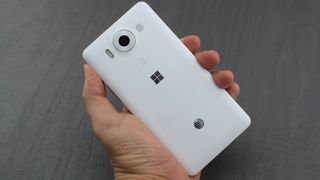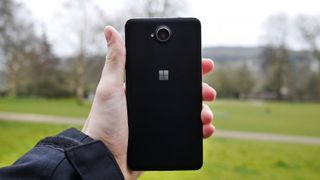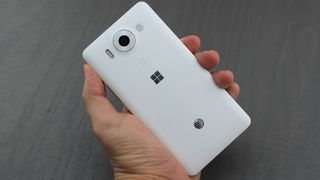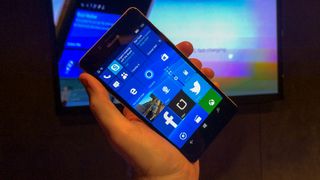Surface Phone isn’t real but it’s already Microsoft’s most important device
One last chance

The Surface Phone isn’t real yet but it is already proving to be one of the most important devices Microsoft will ever launch.
Shareholders are losing faith in Microsoft’s mobile plans. Windows Phone users are also losing faith in Microsoft’s mobile plans. This means that if and when the device does appear, it will be either the savior of the operating system, or the death of it.
Currently, the outlook for Windows Phone is grim. The Lumia 950 and Lumia 950 XL are both out of stock on Microsoft’s website in the UK and there’s no sign of either device receiving a restock.
Microsoft, however, is still upbeat, telling TechRadar: “Microsoft remains committed to Windows as a platform and will focus our small screen experiences on the emerging 3-in-1 Category.”
That’s very careful wording. The quote suggests phones such as the Lumia 650 – a handset which didn’t feature Continuum, Microsoft’s own productivity tool that allows you complete tasks on a desktop setup much like a computer – isn’t going to see a follow up.

Dig a little deeper and it gets worse. At the end of 2016, the Lumia 650 is still the only phone Microsoft has launched this year.
Pair the lack of a flagship phone release and Microsoft’s own claim it will be focusing on high-end 3-in-1 devices, it’s quite clear that not only is the company is ready to launch a new Windows Phone device, it needs to launch one to stay relevant.
Get daily insight, inspiration and deals in your inbox
Get the hottest deals available in your inbox plus news, reviews, opinion, analysis and more from the TechRadar team.
November also marked a year after the release of Windows 10 Mobile alongside the Lumia 950/Lumia 950 XL pairing. Both those phones were once heralded as a new era for Microsoft devices - but a year on and you can’t buy a Continuum device directly from Microsoft.

The US does still have stock for both the Lumia 950 and Lumia 950 XL, but the company isn’t pushing either of them in terms of marketing.
Rumors of a Lumia 960 have been non-existent too - instead the leaks have focused on the long rumored Surface Phone. The latest leaked specs suggest the Surface Phone is set to come with 6GB of RAM, the most recent Qualcomm Snapdragon 835 chipset and the ability to use laptop-like accessories.
We’d expect that to be a combination of a keyboard, a mouse and maybe even a stylus. Essentially, Microsoft’s commitment to the 3-in-1 market makes sense alongside what we’ve seen of the Surface Phone so far.
It's not over yet
But if the company decides to drop its budget Lumia line and the Surface Phone doesn’t take off the company will have no reason to continue on in the mobile space. It’s a big gamble, but one it really needs to take.
Microsoft did confirm to TechRadar the company plans to “support Lumia phones such as the Lumia 650, Lumia 950, and Lumia 950 XL, and phones from OEM partners like Acer, Alcatel, HP, Trinity and VAIO.”
But that said, if you own one of those devices you’d only expect it to be supported for another year or two anyway. Therefore the Surface Phone is going to be make or break point. A failure for the Surface Phone may mean the end of Windows 10 Mobile altogether.
Some other manufacturers such as HP and Acer are embracing the tiled platform, but it likely won’t be enough to keep Microsoft on board with it if there’s no success with its own phones.

Even if it did keep Windows 10 Mobile going, Microsoft’s withdrawal from creating software for the space would make a gaping wound in the side of the third most popular phone OS.
Windows Phone has already had a tough couple of years losing 1.4% of its market share between Q3 2015 and Q2 2016. Now less than half a percent of mobile devices around the world are running Windows Phone software.
With Microsoft focusing directly on 3-in-1 devices, the company has to succeed with the Surface Phone.
Mobile World Congress is a second home for Microsoft – the last two years have seen the announcement of the Lumia 650, Lumia 640, Lumia 640 XL and even the Surface Pro 3 – so it may be we see the Surface Phone before March 2017.
There’s no better place for Microsoft to announce the Surface Phone, but it has to work or it may be the end for the underdog mobile OS.
- Best camera phone: which is the best in 2016?
James is the Editor-in-Chief at Android Police. Previously, he was Senior Phones Editor for TechRadar, and he has covered smartphones and the mobile space for the best part of a decade bringing you news on all the big announcements from top manufacturers making mobile phones and other portable gadgets. James is often testing out and reviewing the latest and greatest mobile phones, smartwatches, tablets, virtual reality headsets, fitness trackers and more. He once fell over.
Most Popular




